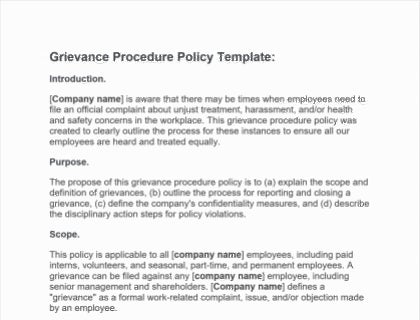
Tina Visagie is a Copywriter at Betterteam. She has written extensively about small businesses and branding, and has experience in journalism, PR, and social media management.

A grievance procedure policy outlines a business's processes and guidelines for filing a formal complaint regarding a workplace, job, and/or coworker dispute or issue. Businesses implement a grievance procedure policy to help address employee concerns in a constructive and fair manner.

Download our customizable grievance procedure policy in Microsoft Word format.
[Company name] is aware that there may be times when employees need to file an official complaint about unjust treatment, harassment, and/or health and safety concerns in the workplace. This grievance procedure policy was created to clearly outline the process for these instances to ensure that all of our employees are heard and treated equally.
The propose of this grievance procedure policy is to (a) explain the scope and definition of grievances, (b) outline the process for reporting and closing a grievance, (c) define the company's confidentiality measures, and (d) describe the disciplinary action steps for policy violations.
This policy is applicable to all [company name] employees, including paid interns, volunteers, and seasonal, part-time, and permanent employees. A grievance can be filed against any [company name] employee, including senior management and shareholders. [Company name] defines a "grievance" as a formal work-related complaint, issue, and/or objection made by an employee.
[Company name] encourages employees to resolve minor disputes with the help of a liaison officer, manager, and a human resource (HR) department representative. If the informal complaint is not fairly and constructively resolved within [number of days], employees may file a formal grievance.
Employees can file grievances when:
[Company name] also recognizes that every case is different and this list is subject to change, depending on the definition filed in the Grievance Complaint Form.
When filing a grievance, employees have the option of reporting their complaints using the company's official online portal or contacting their direct supervisor and the HR department. In both cases, employees will be required to complete and file a Grievance Complaint Form.
Once the complaint has been submitted to the HR department, employees have the right to attend meetings with a witness or union representative, appeal decisions, and depending on the severity of the complaint, refuse to attend work until the grievance is resolved.
When a grievance is filed against another employee, the accused also reserves the right to:
It is [company name's] responsibility to:
[Company name] employees, including senior management and HR representatives, are required to sign a Confidentiality Agreement that limits them from discussing the grievance before and after it has been resolved. All parties are prohibited from discussing the matter with any other [company name] employee.
If an employee is found to have violated the grievance procedure policy, they will be subject to disciplinary action, up to and including termination. The severity of each case will determine the type of disciplinary action, which may include a verbal or written warning, suspension, and/or termination.